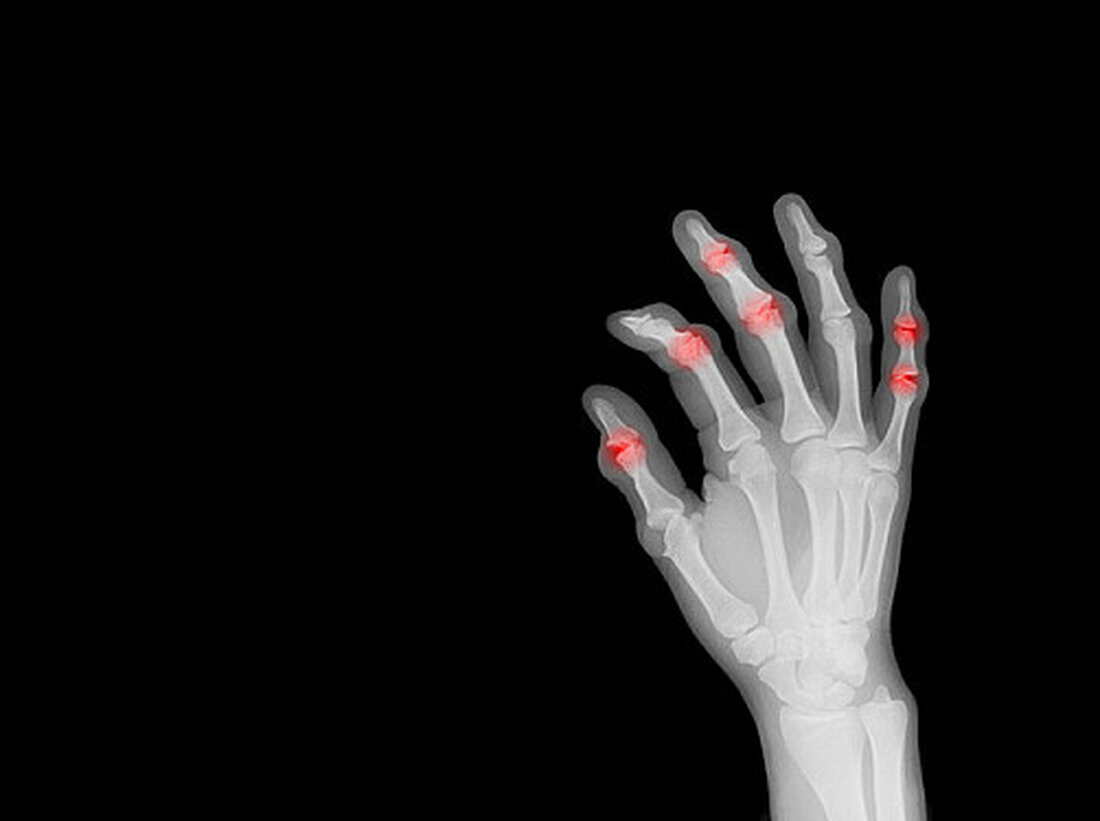Treatments for rheumatoid arthritis can reduce the risk of dementia
Suppressing inflammation may be key. Rheumatoid arthritis (RA) is an autoimmune disease that affects up to 3% of the population. Joint inflammation, the hallmark of the disease, causes swelling, stiffness, and limited movement, particularly in the small joints of the hands and wrists. But inflammation in rheumatoid arthritis isn't limited to the joints—it's present throughout the body. For example, skin nodules, eye inflammation, and lung scarring are well-known features of rheumatoid arthritis, all related to uncontrolled inflammation. Interestingly, inflammation can play an important role in dementia. So could anti-inflammatory drugs for rheumatoid arthritis affect the likelihood of dementia? …

Treatments for rheumatoid arthritis can reduce the risk of dementia
Suppressing inflammation may be key.
Rheumatoid arthritis (RA) is an autoimmune disease that affects up to 3% of the population. Joint inflammation, the hallmark of the disease, causes swelling, stiffness, and limited movement, particularly in the small joints of the hands and wrists.
But inflammation in rheumatoid arthritis isn't limited to the joints—it's present throughout the body. For example, skin nodules, eye inflammation, and lung scarring are well-known features of rheumatoid arthritis, all related to uncontrolled inflammation. Interestingly, inflammation can play an important role in dementia. So could anti-inflammatory drugs for rheumatoid arthritis affect the likelihood of dementia?
Can treating rheumatoid arthritis reduce the risk of dementia?
Recent studies suggest the answer may be yes. Maybe that shouldn't be surprising. The role of inflammation in Alzheimer's disease and other types of dementia has been a research focus for decades, and treatments for rheumatoid arthritis reduce inflammation.
Given that there are currently no effective preventive treatments for Alzheimer's disease or other forms of dementia, the observation that RA treatments could prevent dementia could be groundbreaking.
What evidence supports this idea? Here are some of the most recent and compelling observational studies.
- Eine 2019 veröffentlichte Studie berichtete, dass Menschen mit RA, die mit Standardmedikamenten behandelt wurden, über einen Zeitraum von fünf Jahren weniger als die Hälfte des Risikos hatten, an Demenz zu erkranken, verglichen mit Menschen ohne RA.
- Eine Studie aus dem Jahr 2021 ergab, dass die Demenzraten bei Menschen mit RA in den letzten Jahrzehnten zurückgegangen und in der Gesamtbevölkerung gestiegen sind. Während dieser Zeit hatten sich die Behandlungen für RA verbessert.
- Eine Studie aus dem Jahr 2022, in der Menschen untersucht wurden, die verschiedene Arten von RA-Behandlungen erhielten, liefert einige der überzeugendsten Ergebnisse. Es stellte sich heraus, dass Menschen mit RA, die die neuesten und wirksamsten Behandlungen einnahmen, in den drei Jahren der Studie 19 % seltener an Demenz erkrankten als diejenigen, die mit älteren Arzneimitteln behandelt wurden. Beim Vergleich von Personen, die eine Reihe neuerer Medikamente einnahmen, gab es keinen signifikanten Unterschied in der Demenzrate.
Taken together, these studies suggest that certain treatments that help rheumatoid arthritis may do more than just protect the joints; they could also protect the brain. This is not the first time that a drug has had an unexpected positive side effect. But it could be one of the most important.
Is additional research needed?
While evidence is mounting that anti-inflammatory drugs could reduce the risk of dementia, more research is needed:
- Beobachtungsstudien können die Ursache nicht beweisen. Sie beobachten einfach Demenzraten bei verschiedenen Personengruppen, was bedeutet, dass andere Faktoren für die Ergebnisse verantwortlich sein könnten. Beispielsweise wurden in der Studie von 2022 das Rauchen und die Familienanamnese nicht bewertet, die zu Demenz beitragen. Wenn die Gruppe, die ältere RA-Behandlungen erhielt, mehr Risikofaktoren für Demenz hatte, könnten die Medikamente die Ergebnisse nicht erklären. Aussagekräftigere Beweise stammen aus randomisierten kontrollierten Studien, in denen ansonsten ähnliche Personen nach dem Zufallsprinzip verschiedenen Behandlungsgruppen zugeordnet und ihre Gesundheit im Laufe der Zeit analysiert werden.
- Die Ergebnisse können bei unterschiedlichen oder vielfältigeren Gruppen von Studienteilnehmern abweichen. Beispielsweise waren die Teilnehmer der Studie von 2022 ältere Erwachsene (Durchschnittsalter 67), überwiegend Weiße (75 %) und überwiegend Frauen (80 %).
- Unabhängige Forschung ist notwendig, um die Ergebnisse zu bestätigen. Eine einzelne Studie einer Gruppe von Forschern ist selten überzeugend, insbesondere bei einem so wichtigen Thema wie der Prävention von Demenz.
- Eine längerfristige Nachsorge ist erforderlich. Rheumatoide Arthritis ist eine lebenslange Krankheit, daher erzählen Studien, die drei bis fünf Jahre dauern, möglicherweise nicht die ganze Geschichte.
- Wir sind uns nicht sicher, wie bestimmte Medikamente gegen RA das Gehirn schützen könnten. Wir wissen auch nicht, ob diese Behandlungen für Menschen ohne RA wirksam sein könnten.
It is reasonable to believe that reduced inflammation, rather than a specific drug, provides benefit, as different medications with different methods of dampening inflammation have been linked to a lower risk of dementia in people with RA. But we need more research to prove that this is true.
The end result
Treatments developed over the past 50 years have transformed rheumatoid arthritis from an often disabling disease into a chronic disease that is usually well controlled. The initial choice of treatment depends on a combination of factors, including effectiveness, side effect profile, route of administration (most people prefer pills to injections), cost, and whether a drug is covered by health insurance.
Another consideration could soon be added to that list: a drug's ability to reduce the risk of dementia. This could be particularly relevant for people with rheumatoid arthritis who have a strong family history of dementia.
And what about people without RA? I think it's only a matter of time before studies examine whether anti-inflammatory drugs can reduce the risk of dementia even in people without inflammatory diseases like RA. While it's impossible to predict what these studies will show, one thing is certain: the impact of a positive study would be enormous.

 Suche
Suche
 Mein Konto
Mein Konto